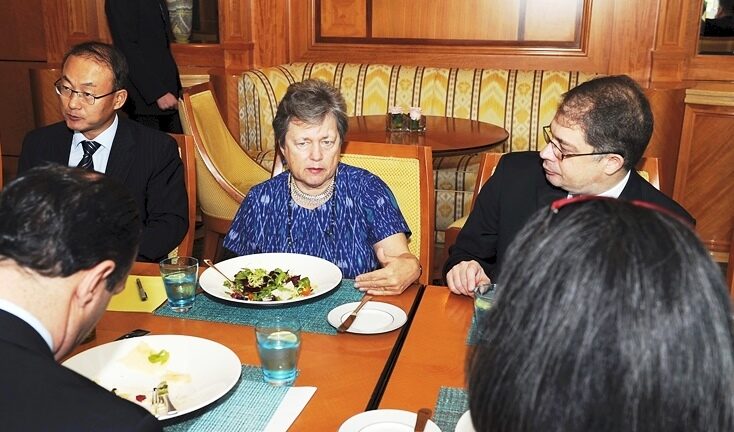American Studies, Dialogue Series, Regional Studies
Carol Lancaster on the Results and Consequences of the U.S. Mid-term Elections

Carol Lancaster, Dean of the Edmund A. Walsh School of Foreign Service and Professor of Politics at Georgetown University, lectured to a group of Georgetown faculty and Qatar-based diplomats on November 14, 2010 on the subject of “The Results and Consequences of the US Mid-term Elections.”
The mid-term elections, Lancaster said, “were predicted to be a setback for Obama and predicted to produce a change in the Congress.” These forecasts, she said, were true insofar as “the change of party in the House of Representatives was dramatic,” but, although “the democrats will control the Senate, they will not control much, because in order to get anything through the U.S. Senate, you normally have to have sixty votes.”
Explaining various elements of the United States government structure, Lancaster said that “the Congress can block the president from doing almost anything that requires a congressional vote. […] Currently, the Republicans have the votes in the House to block legislation, but, similarly, Obama can block legislation from the Congress, because he has the veto power,” which, she said, “is a recipe for stalemate.”
One of the major issues that will be affected after the mid-term elections, Lancaster said, is the size and distribution of the federal budget. “The Republicans are either going to have to pass a budget, which means they are going have to compromise on a variety of issues because they cut everything they want, or not pass a budget, in which case, I think they’ll be blamed for impeding life and the economy of the United States.” If the Republicans do compromise with the administration in passing a budget, then the right-wing will become part of what they criticized in their bids to become elected – “too much wheeling and dealing in Washington.”
The second test, Lancaster argued, will be raising the federal debt limit. “If you don’t raise the limit on the federal debt and the federal government cannot borrow, then it cannot pay its bills. We will be essentially bankrupt.” In this case, “if the new Republican members of Congress, especially the very right wing ones, put above all else limiting the growth in federal borrowing and spending, they will have to block raising the debt limit for federal borrowing. If they do not vote to raise the limit, they will be blamed for what could be an economic disaster.”
Regarding the future of American foreign policy influenced by the Republicans, Lancaster argued that “I think what we are going to see is a more aggressive American foreign policy, if the Congress has its way. I think the people who will be coming into key positions – some of them at least – are more hostile to Iran, more supportive of Israel, and more hostile to North Korea.”
Further, Lancaster speculated how the results of the mid-term elections will be used to influence the 2012 elections. “The Republicans may decide that this is really the beginning of the presidential elections of 2012 and they will maneuver politically to position themselves for a better shot at the presidency.” In this case, the Democrats will need to make some serious changes to their mode of operation, because “over the last two years, Obama has left the definition of issues – the healthcare bill, the economic stimulus, etc. – to the opposition.” If he continues to let the Republicans define these issues through the media and other public forums, then, Lancaster said, the President may have a hard time winning a second term.
In conclusion, Lancaster argued that at every presidential election, the two parties are regularly being voted in and out and that is because “we have a closely divide electorate, which goes back and forth.” She added that “It isn’t that they are voting for something; it is that they are voting against something and that isn’t a very stable way of governing.” There are two underlying and largely contradictory philosophies that are the basis of the United States model. She argued that “since the beginning of the American republic, we have had a very strong libertarian impulse in our politics,” but “since the depression, we have had a ‘social democratic’ impulse which is more comfortable with government addressing social and economic problems.” There are tensions between these two traditions that are played out and negotiated every election year.
Article by Suzi Mirgani, CIRS Publications Coordinator